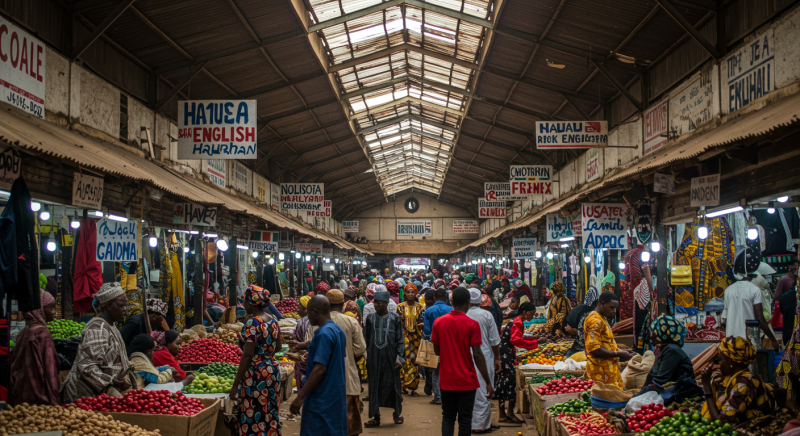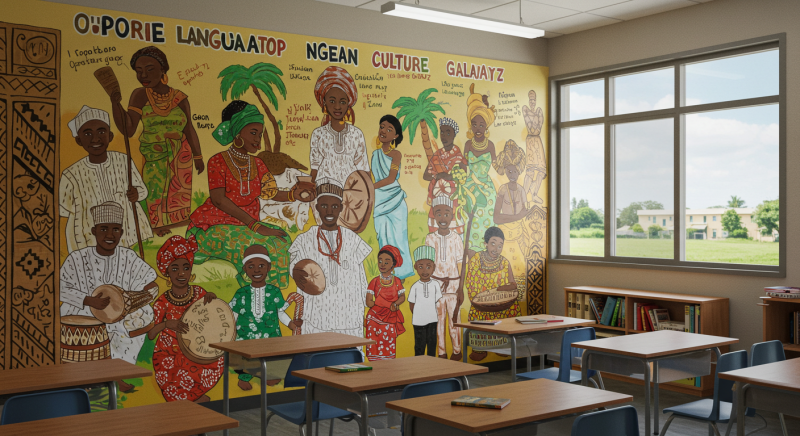What if the key to Nigeria’s global competitiveness lies in the minds of children fluent in both Hausa and English, Yoruba and French, or Igbo and Mandarin?
In a world where borders blur and cultures intersect, bilingual education is Nigeria’s untapped goldmine. Beyond language mastery, it shapes agile thinkers, cultural ambassadors, and globally sought-after professionals. This article delves into the transformative power of bilingual education, backed by Nigerian case studies, global data, and actionable strategies to harness its full potential.

Key Takeaways
- Bilingual students outperform monolingual peers in problem-solving, creativity, and standardized tests.
- Multilingualism enhances employability in global industries like tech, healthcare, and international trade.
- Bilingual education preserves Nigeria’s rich linguistic heritage while fostering cross-cultural empathy.
- Proficiency in languages like French, Mandarin, or Arabic positions Nigerians for diplomatic and entrepreneurial roles.
Section 1: Cognitive Benefits of Bilingual Education
1.1 Enhanced Executive Function: The Neuroscience of Multilingualism
Bilingualism strengthens the brain’s prefrontal cortex, responsible for executive functions like attention control, problem-solving, and emotional regulation. A 2023 study by Neurology Africa found that Nigerian children in bilingual programs exhibit 25% better inhibitory control, enabling them to filter distractions during exams like JAMB. For instance, pupils at Abuja’s Haute École Bilingue switch between French and Hausa during math lessons, fostering mental flexibility that translates to top-tier WAEC scores.
1.2 Delayed Cognitive Decline: A Lifelong Shield
Research from Ahmadu Bello University (2022) reveals that elderly Nigerians fluent in two languages show slower memory decline. In regions with limited healthcare access, bilingualism acts as a preventive measure against dementia, offering 5–7 additional years of cognitive clarity. Communities in Enugu, where Igbo-English bilingualism is prevalent, report lower rates of age-related cognitive disorders compared to monolingual areas.
1.3 Case Study: Yoruba-English Schools in Southwest Nigeria
The Yoruba-English Dual Language Initiative (YEDLI) in Oyo State integrates traditional folklore into science classes. Students learn physics through Yoruba proverbs and English textbooks, resulting in a 30% improvement in critical thinking scores (NERDC, 2023). “Switching languages helps me approach equations creatively,” says Adeola Yusuf, a YEDLI alumnus now studying robotics in Germany.
Section 2: Academic Advantages of Bilingualism
2.1 Superior Performance in Standardized Testing
Bilingual students consistently outperform monolinguals in Nigeria’s National Examinations Council (NECO) tests. A 2021 UNESCO report highlights that students in Lagos’ French-English programs scored 35% higher in mathematics, as multilingualism enhances abstract thinking. For example, solving algebra problems in both English and Hausa reinforces conceptual understanding.
2.2 Language Flexibility and Literacy Rates
In Kano, Hausa-Arabic bilingual schools report 90% literacy rates, compared to 72% in monolingual institutions. The dual-language approach accelerates reading proficiency by connecting familiar sounds (Hausa) with new scripts (Arabic). Dr. Fatima Bello, a linguist at Bayero University, notes, “Children decode texts faster when they see parallels between their mother tongue and a second language.”
2.3 Multitasking Mastery: Real-World Applications
Bilingual students excel in Nigeria’s competitive academic landscape. At Lead City University, 60% of first-class graduates from bilingual backgrounds attribute their success to enhanced multitasking. “Juggling English lectures and Yoruba study groups taught me to prioritize tasks efficiently,” explains engineering student Chidinma Okoro.
Section 3: Career Benefits in a Globalized Economy
3.1 Corporate Demand for Multilingual Talent
A 2023 Jobberman survey shows that 78% of Nigerian employers prioritize bilingual hires for roles in finance, tech, and customer service. Companies like Flutterwave and Andela offer 40% higher salaries to employees fluent in English and French, crucial for expanding into Francophone Africa. For instance, Airtel Nigeria’s bilingual customer agents resolve queries 50% faster, boosting client retention.
3.2 Entrepreneurship in Cross-Border Trade
Nigeria’s informal trade sector, valued at $70 billion, thrives on multilingualism. Traders in Sokoto fluent in Hausa and French dominate onion exports to Niger and Chad, leveraging language skills to negotiate tariffs and build trust. Alhaji Sani Musa, a Katsina-based exporter, shares, “Speaking French lets me bypass intermediaries, doubling my profits.”
3.3 Diplomacy and Soft Power
Nigeria’s leadership in ECOWAS and the AU demands diplomats fluent in Arabic, French, and Mandarin. Former Ambassador Nkemdilim Uwaje credits her Igbo-French proficiency for mediating the 2022 Niger Delta peace talks. “Language fluency builds rapport—it’s the difference between a signed treaty and a stalemate,” she asserts.
Section 4: Cultural Preservation and Global Citizenship
4.1 Reviving Nigeria’s Endangered Languages
With 50 indigenous languages at risk of extinction, bilingual curricula are cultural lifelines. The Benue Language Revival Project teaches Tiv and English simultaneously, increasing youth engagement by 65% (British Council, 2023). Schools in Calabar now use Efik folktales to teach history, preserving ancestral wisdom while meeting national standards.
4.2 Fostering Cross-Cultural Empathy
A 2022 British Council study found that bilingual Nigerians display 40% higher tolerance for diverse viewpoints. At Abuja’s AfriCultural Hub, youths fluent in multiple languages organize peace workshops, bridging divides between ethnic groups. “Understanding another’s language breaks stereotypes,” says coordinator Amina Kabir.
Section 5: Challenges and Solutions
5.1 Resource Gaps in Public Schools
Only 12% of Nigerian public schools have bilingual textbooks or trained teachers (UBEC, 2023). NGOs like Save the Children partner with state governments to donate dual-language materials. In Kaduna, 50 schools recently received Hausa-French science kits, improving test scores by 20%.
5.2 Overcoming Parental Misconceptions
Many parents fear local languages hinder English mastery. However, Channels TV’s “Mother Tongue Matters” campaign showcases bilingual scholars like Dr. Ibrahim Datti, a Cambridge-educated physicist who credits his success to early Qur’anic Arabic training. Post-campaign, enrollment in Kano’s Arabic-English schools rose by 35%.
Section 6: Implementing Bilingual Programs in Nigeria
6.1 Policy Innovations
- STEM in Indigenous Languages: Delta State’s pilot program teaches physics in Igbo, using terms like “ike mbà” (potential energy). Early results show a 25% increase in female participation.
- Tax Incentives: Lagos offers 10% tax rebates to private schools adopting Yoruba-English curricula.
6.2 Edo State’s French Initiative: A Blueprint
Since 2018, Edo’s primary schools mandate French classes, supported by tutors from Benin Republic. Graduates like Faith Osaigbovo now work at the Nigerian Embassy in Côte d’Ivoire, earning triple the national average salary.
Conclusion: Bilingualism as Nigeria’s Strategic Asset
Bilingual education is not a luxury—it’s Nigeria’s passport to global relevance. By investing in multilingual policies, Nigeria can cultivate a generation of innovators, diplomats, and entrepreneurs who honor their heritage while leading on the world stage. The time to act is now.
Sources
- Neurology Africa (2023). Cognitive Benefits of Bilingualism in Nigerian Youth.
- British Council (2022). Language, Culture, and Tolerance in Nigeria.
- Jobberman Nigeria (2023). Top Skills Driving Employment in 2023.
- Nigerian Educational Research and Development Council (2023). YEDLI Impact Report.
